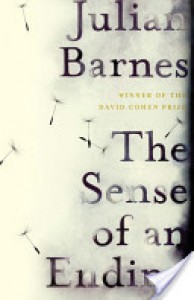The Sense of an Ending by Julian Barnes

‘History is the lies of the victors,’ I replied, a little too quickly.
‘Yes, I was rather afraid you’d say that. Well, as long as you remember that it is also the self-delusions of the defeated.’
This is the story of Tony Webster, narrating the memories of his youth from the twilight of his life. I particularly liked his ability to change his voice. When he was narrating the events of his youth, he sounded so young and carefree, and when it turned to the present time, he sounded old. It’s distinctive, and I like the distinction.
However, he is a decidedly unreliable narrator; it is obvious that he rewrote his memories - some parts repeatedly. Possibly he deliberately chose the easier option to remember things differently.
I told her the story of my life. The version I tell myself, the account that stands up.
The answer to the question of “what happened?” always depends on who you’re asking. Tony’s version of the truth, from his perspective, is something that he never admitted and never would, because (I think) he doesn’t want to. Saying something aloud, or sometimes merely the act of admitting it to oneself, sometimes makes it true and undeniable as though it has been set on stone. The story is littered with clues aplenty for the readers’ interpretations. There is, therefore, no fixed ending, but only a sense of an ending; thus the title.
You still don’t get it. You never did, and you never will.
And because Tony “never got it”, the reader never did get it handed out to them on a silver platter, either. We could only make guesses. There are a lot of things that don’t stand up in Tony’s account of his youth, for example an inexplicable guilt over something that could not possibly be his fault – unless, of course, it somehow was, since Tony totally owns the art of unreliable narration.
When we are young, we invent different futures for ourselves; when we are old, we invent different pasts for others.
I am not sure that Tony invented different pasts for others. Unless if there is an entire world of “others” that comprises solely of himself. I think he is the sort of person who would sit down and daydream that his past was different, and extrapolate it to how his current situation would therefore be different. I don’t believe that anyone who had this amount of imagination to invent multiple different circumstances – timelines and parallel worlds, if you will – would stop doing so because he aged. Daydreaming is a very individualistic thing to do, and in many cases is a form of wish fulfilment. Which is very sad, but well. As long as you remember that what you see in the Mirror or Erised is not reality, I suppose.
History isn’t the lies of the victors; I know that now. It’s more the memories of the survivors, most of whom are neither victorious nor defeated.
‘Yes, I was rather afraid you’d say that. Well, as long as you remember that it is also the self-delusions of the defeated.’
This is the story of Tony Webster, narrating the memories of his youth from the twilight of his life. I particularly liked his ability to change his voice. When he was narrating the events of his youth, he sounded so young and carefree, and when it turned to the present time, he sounded old. It’s distinctive, and I like the distinction.
However, he is a decidedly unreliable narrator; it is obvious that he rewrote his memories - some parts repeatedly. Possibly he deliberately chose the easier option to remember things differently.
I told her the story of my life. The version I tell myself, the account that stands up.
The answer to the question of “what happened?” always depends on who you’re asking. Tony’s version of the truth, from his perspective, is something that he never admitted and never would, because (I think) he doesn’t want to. Saying something aloud, or sometimes merely the act of admitting it to oneself, sometimes makes it true and undeniable as though it has been set on stone. The story is littered with clues aplenty for the readers’ interpretations. There is, therefore, no fixed ending, but only a sense of an ending; thus the title.
You still don’t get it. You never did, and you never will.
And because Tony “never got it”, the reader never did get it handed out to them on a silver platter, either. We could only make guesses. There are a lot of things that don’t stand up in Tony’s account of his youth, for example an inexplicable guilt over something that could not possibly be his fault – unless, of course, it somehow was, since Tony totally owns the art of unreliable narration.
When we are young, we invent different futures for ourselves; when we are old, we invent different pasts for others.
I am not sure that Tony invented different pasts for others. Unless if there is an entire world of “others” that comprises solely of himself. I think he is the sort of person who would sit down and daydream that his past was different, and extrapolate it to how his current situation would therefore be different. I don’t believe that anyone who had this amount of imagination to invent multiple different circumstances – timelines and parallel worlds, if you will – would stop doing so because he aged. Daydreaming is a very individualistic thing to do, and in many cases is a form of wish fulfilment. Which is very sad, but well. As long as you remember that what you see in the Mirror or Erised is not reality, I suppose.
History isn’t the lies of the victors; I know that now. It’s more the memories of the survivors, most of whom are neither victorious nor defeated.


